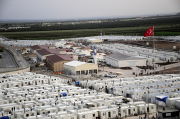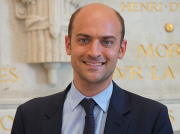
Manchester United fans thronged around the club's Old Trafford ground on Monday to pay tribute to Alex Ferguson, their iconic manager who is retiring after guiding the Red Devils to the English Premier League title for a 13th time.
Dressed in the club's red, black and white colours, supporters were out in force in the northwestern city to cheer on the open-top bus tour jointly marking United's 20th title triumph and 71-year-old Ferguson's extraordinary 26-year career transforming the club into a powerhouse of world football.
The victory parade was to get under way with a send-off event at 6:00 pm local time (1700 GMT) outside the East Stand at Old Trafford.
Some fans had been waiting outside for eight hours to see Ferguson with the Premier League trophy one last time.
Supporters waved flags reading "Champions 2013", blew horns and sang "Fergie, we love you".
One banner erected at the start of the route read: "Sir Alex, nobody wants you to go but we all want to say thank you for staying so long."
Ferguson and club captain Nemanja Vidic were expected to address the crowd before the bus leaves via Sir Matt Busby Way, named in honour of United's post-war Scottish manager who guided them to five English championships in the 1950s and 1960s and the first European Cup triumph for an English club in 1968.
Ray Hurst, who has been a Red Devils fan for 48 years, stood outside the East Stand entrance to say farewell to Ferguson.
The 67-year-old, who lives in Bolton near Manchester, said he was "welling up" at seeing Ferguson wave goodbye.
"He's made our dreams come true and in great style, with fantastic football," he told AFP. "He inherited a pretty poor squad and it took him a few years to clear it out. He built it up bit by bit.
"I want to say to him: thanks for the memories.
"It's going to be a transition now. We need to back the new manager David Moyes and give him time -- just as we did with Fergie."
Alexine Blackburn, a carer from the Wythenshawe district, was stood by Old Trafford's memorial to the 1958 Munich Air Disaster that claimed the lives of eight United players among the 23 fatalities.
She had a red and white flag reading "Thank you Sir Alex" and gave it a big kiss.
"I've come to see the legend Sir Alex, I'm coming to say goodbye to him," she said.
"It broke my heart when he announced his retirement. He made me cry and I've been crying all week."
Tony Chaloryoo, from central Thailand but now living in Sheffield, northern England, posed for pictures outside Old Trafford.
He got there eight hours before the parade began.
"Alex Ferguson is one of the best football managers in history, one of the most brilliant. With Sir Alex retiring, nothing will be the same because he is the saviour of Manchester United.
"I think we will have to wait five to 10 years before we become champions again. Many good players will go now."
After leaving Old Trafford, the bus tour was set to terminate in Albert Square where fans were expected to gather in large numbers in front of Manchester Town Hall, to hear Ferguson give one last speech to the adoring faithful.
Fans of rival club Manchester City like to deride United supporters as out-of-town glory hunters, more likely to be found in London, Cape Town, Bangkok or Tokyo than in the Manchester Arndale shopping centre.
But if Manchester is an instantly-recognisable word in Mumbai or Beijing, it is in large part down to Ferguson's football magic at Old Trafford.
Manchester boomed in the 19th century, becoming one of the world's first industrialised cities on the back of textile manufacturing.
The cotton mills' decline after World War II left Manchester a somewhat derelict and depressing post-industrial landscape by the 1980s, as encapsulated in The Smiths' gloomy songs.
But the Ferguson-inspired football dominance of the 1990s onwards, fuelled by United's exciting young players like Ryan Giggs, David Beckham and Paul Scholes, helped make Manchester a vibrant cultural epicentre, as urban renewal came at last, matched by the beat of rock anthems by City supporters Oasis.
Manchester is now a heartland for sport, music and the media too after the BBC moved a heavy chunk of their operations out of London.
Now the city has the chance to bid farewell to a man who helped make Manchester what it is today.
AFP







































